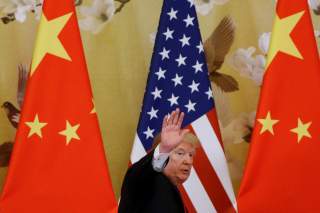How Trump Could Stumble from a Trade War Into a Real War with China
The past five hundred years have seen sixteen cases in which a rising power threatened to topple a ruling power from its position of predominance. Twelve ended in war.
The Korean War of 1950 stands as a sharp reminder of great powers’ vulnerability to the impact of third party provocations. Could North Korea’s Kim Jong-un trigger a war between the United States and China? If that seems inconceivable, then consider what his grandfather did. In January, 1950, war with China had no place on the American agenda. That option had been considered during the Chinese Civil War but decisively rejected—since it would mean sending American troops to fight on the Asian mainland. In 1950, Mao had just lead China’s Communists to victory in a long bloody civil war and was focused on consolidating control of his country. The thought of war with a nation that had an economy fifty times his size, a monopoly of nuclear weapons, and had just dropped atomic bombs on Japan five years earlier to end World War II was unthinkable.
But in June 1950 North Korea launched a surprise attack on South Korea. In just three months it stood on the verge of success in seizing the peninsula. At the last minute, the United States came to the rescue. Gen. Douglas MacArthur and two divisions of U.S. forces still in occupied Japan landed in Korea and rapidly fought the North Koreans back up the path they had come down. Without properly considering the consequences, they crossed the 38th Parallel—the dividing line between the two Koreas—and were driving toward the Chinese border expecting to unify the country before Christmas. But then, out of the blue and to McArthur’s astonishment, they awoke one morning to find themselves under attack by three hundred thousand Chinese. These were soon reinforced by a half million additional troops who beat the Americans back down the peninsula to the 38th Parallel where the United States sued for peace. Most of the fifty thousand Americans who died in this war were killed by Chinese; and most of the hundreds of thousands of Chinese fatalities came at the hand of Americans.
With the prospect of a summit between Trump and Kim Jong-un in late May, most of us are hoping for a minor miracle. But if as most experts expect this summit fails, what then? Kim will resume preparations for the final series of ICBM tests that will give him a credible threat to strike San Francisco with nuclear weapons. If Trump does what he has repeatedly pledged to do and orders cruise-missile attacks on the ICBM launch pads to prevent the tests, then North Korea is likely to retaliate with barrages of rockets raining down on Seoul killing tens of thousands of its citizens. The U.S. and South Korean forces will respond by attacks on North Korean rockets and missiles to prevent further strikes on the capital. At that point, the second Korean War will have begun. Since tens of thousands or more Americans would die in this war, it is hard to imagine an American president ending it with the Kim regime in place. But as China has repeatedly warned, Beijing will never accept a unified Korea that is a U.S. military ally. That line was drawn in blood when Mao led China into the Korean War.
In sum: is war between the United States and China inevitable? Certainly not. Even on the historical record, as noted earlier, four of the sixteen cases ended without war. Moreover, there are significant differences between the U.S.-China rivalry and previous cases—not the least of which is that we can learn lessons from both the mistakes and successes of statesmen of earlier eras. Am I expecting the current conflict over tariffs to end with bombs or bullets? No.
But have we entered a period of fundamental reassessment of the challenge posed by a nation that is rivaling and even surpassing the United States in many domains? Will that reassessment lead to substantial changes in the ways in which Americans and Chinese do business—including trade, investment, supply chain management, and technology and IP sharing? Will the central geostrategic question of this era be whether these two great nations can construct a new form of great-power relations that meets the essential requirements of each without war?
A Chinese half blessing and half curse says: may you live in interesting times. In the current struggle to invent what Xi Jinping has called a “new form of great-power relations,” we do.
Graham T. Allison is the Douglas Dillon Professor of Government at the Harvard Kennedy School. He is the former director of Harvard’s Belfer Center and the author of Destined for War: Can America and China Escape Thucydides’s Trap?
Image: U.S. President Donald Trump waves during joint statements with China's President Xi Jinping at the Great Hall of the People in Beijing, China, November 9, 2017. REUTERS/Thomas Peter

